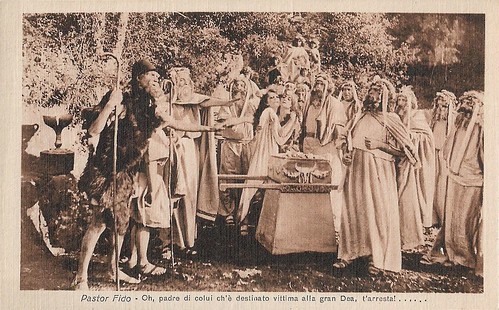
Italian postcard by IPA CT Duplex 9416, no. 1 (from a series of 14 postcards). Photo: Floreal Film. Publicity still for Il pastor fido (Telemaco Ruggeri, 1918). Caption: Oh, father of the one who is destined to be a victim of the Great Goddess, stop!... (Carino, Mirtillo's foster father, indicates Montano as his real father).
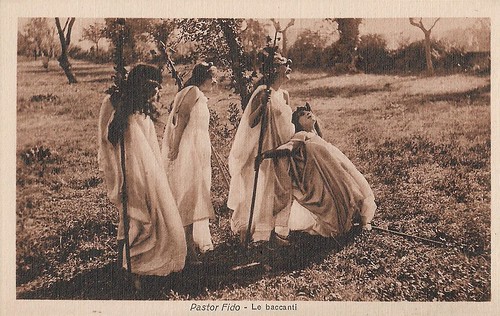
Italian postcard by IPA CT Duplex 9417, no. 2 (from a series of 14 postcards). Photo: Floreal Film. Publicity still for Il pastor fido (Telemaco Ruggeri, 1918). Caption: The Bacchae.
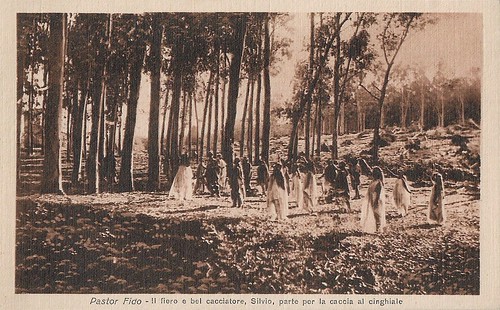
Italian postcard by IPA CT Duplex 9418, no. 3 (from a series of 14 postcards). Photo: Floreal Film. Publicity still for Il pastor fido (Telemaco Ruggeri, 1918). Caption: Proud and handsome hunter Silvio goes boar hunting.
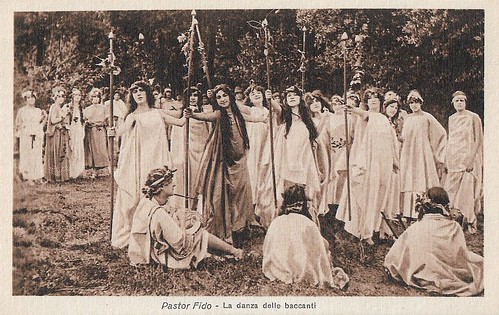
Italian postcard by IPA CT Duplex 9419, no. 4 (from a series of 14 postcards). Photo: Floreal Film. Publicity still for Il pastor fido (Telemaco Ruggeri, 1918). Caption: The dance of the Bacchae.

Italian postcard by IPA CT Duplex 9421, no. 5 (from a series of 14 postcards). Photo: Floreal Film. Publicity still for Il pastor fido (Telemaco Ruggeri, 1918). Caption: The Satyr leads the priests to the cave of Ericina. (Lured by Corisca and the Satyr, the priests discover Amarilli and Mirtillo in the cave).
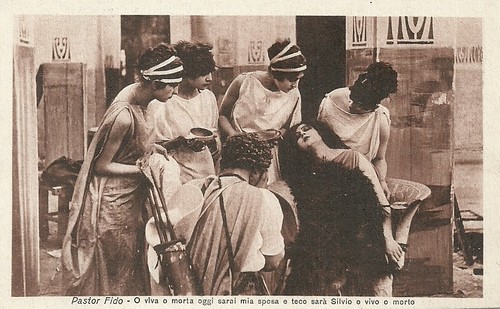
Italian postcard by IPA CT Duplex 9422, no. 6 (from a series of 14 postcards). Photo: Floreal Film. Publicity still for Il pastor fido (Telemaco Ruggeri, 1918). Caption: Dear or alive, today you will be my wife, and with you Silvio will be dead or alive too. (Silvio after he has shot Dorinda and recognised his love).
A secret rendez-vous in a cave
Il pastor fido/The Faithful Shepherd (Telemaco Ruggeri, 1918) was based on the pastoral tragicomedy 'Il pastor fido'(1590) by Giovan Battista Guarini, which was enormously popular in the late 16th and 17th century. It inspired many madrigals by a.o. Claudio Monteverdi, an opera by Georg Friedrich Händel, etc. The text had over 100 re-editions.
The silent Italian film was made by the Roman company Floreal-Film. The sets were designed by Giuseppe Sciti and the cinematography was by Mario Bacino.
The plot deals with two couples who cannot have each other. The Arcadians are forced to sacrifice virgins to the goddess Diana unless two young people of divine descent marry each other. The high-priest Montano, a descendant of Hercules, therefore decides to marry his son Silvio with the nymph Amarilli, a descendant of Pan.
Yet, Silvio is only interested in hunting, despite Dorinda's love for him. Instead, Amarilli loves the shepherd Mirtillo, while he is being loved by the perfidious Corisca. The latter concocts a plan to get rid of her rival Amarilli, warning the priests she is having a secret rendezvous with Mirtillo in a cave.
Amarilli is condemned to death but Mirtillo sacrifices himself to go in her place. Yet, Mirtillo's father comes just in time to declare that Mirtillo is really the son of Montano, so Mirtillo and Amarilli may marry, as both are of divine descent, ending the wrath of the goddess. Silvio too at last has found love with Dorinda, after having her accidentally shot with an arrow, thinking she was a beast. While in Guarini's tale Corisca repents and is forgiven, in the film she commits suicide.
Tito Alacci in the journal Film raved about the luminosity of the images, and the beauty of the actresses and actors, in the first place the main actress Mary Bayma-Riva, as well as Annibale Ninchi, who had the male lead in the film. Instead, Renato Landi in Apollon disliked 'the American style' of the film (meaning the analytical editing) and the too-lose outdoor scenography, even if praising the film too.

Italian postcard by IPA CT Duplex 9424, no. 8 (from a series of 14 postcards - no. 7 is missing). Photo: Floreal Film. Publicity still for Il pastor fido (Telemaco Ruggeri, 1918). Caption: The perfidious Corisca turns with subtle weapons to Mirtillo.
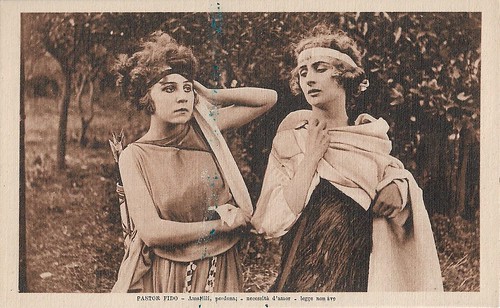
Italian postcard by IPA CT Duplex 9425, no. 9 (from a series of 14 postcards). Photo: Floreal Film. Publicity still for Il pastor fido (Telemaco Ruggeri, 1918). Caption: [Mirtillo:] Amarilli, pardons, the necessity of love has no laws.
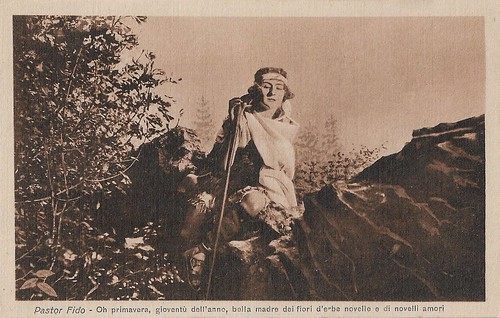
Italian postcard by IPA CT Duplex 9426, no. 10 (from a series of 14 postcards). Photo: Floreal Film. Publicity still for Il pastor fido (Telemaco Ruggeri, 1918). Caption: [Mirtillo:] Oh spring, the youth of the year, beautiful mother of flowers of new herbs and new loves.
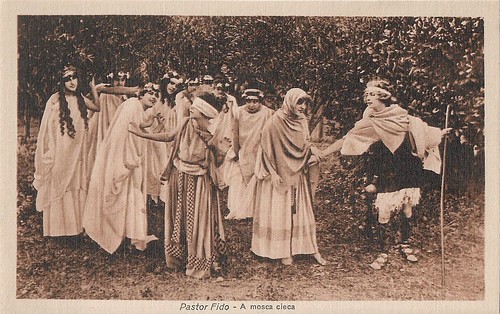
Italian postcard by IPA CT Duplex 9427, no. 11 (from a series of 14 postcards). Photo: Floreal Film. Publicity still for Il pastor fido (Telemaco Ruggeri, 1918). Caption: Blindfolded [Amarilli and Mirtillo].
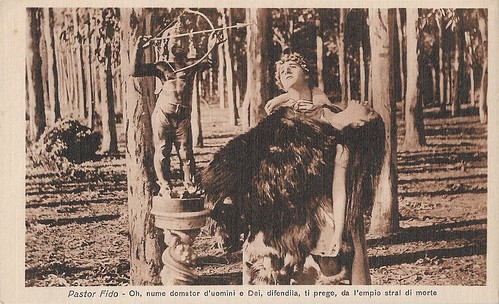
Italian postcard by IPA CT Duplex 9428, no. 12 (from a series of 14 postcards). Photo: Floreal Film. Publicity still for Il pastor fido (Telemaco Ruggeri, 1918). Caption: O god of men and gods, defend her, I pray thee, from the impious snare of death. [Silvio devastated as he has wounded Dorinda, thus discovering love]. Silvio may have been acted by Annibale Ninchi.
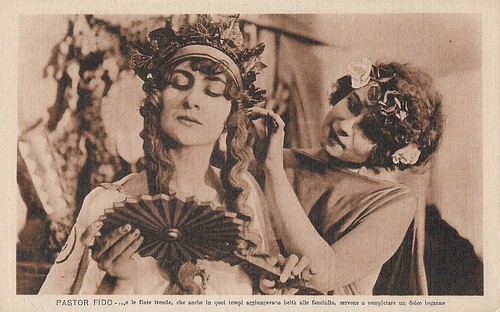
Italian postcard by IPA CT Duplex 9428, no. 13 (from a series of 14 postcards). Photo: Floreal Film. Publicity still for Il pastor fido (Telemaco Ruggeri, 1918). Caption: And the fake braids, which even in those times added beauty to girls, serve to complete a sweet deception [Probably Corisca and Amarilli].
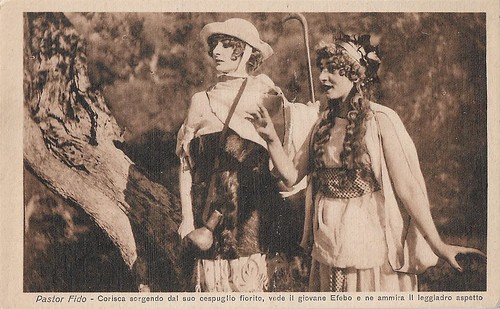
Italian postcard by IPA CT Duplex 9429, no. 14 (from a series of 14 postcards). Photo: Floreal Film. Publicity still for Il pastor fido (Telemaco Ruggeri, 1918). Caption: Glimpsing from her flowering bushes, Corisca sees the young Ephebe and admires his graceful appearance [Corisca and Mirtillo]. It seems like Mirtillo was played by Mary Bayma-Riva, who was the star of the film.
Sources: Aldo Bernardini/Vittorio Martinelli (Il cinema muto italiano - Italian), Wikipedia (Italian, English and Dutch), and IMDb.
No comments:
Post a Comment